Volkswagen Group Bundle
Can Volkswagen Group Maintain Its Dominance in the Evolving Automotive World?
Volkswagen Group, a titan of the automotive industry, is currently navigating a period of unprecedented transformation. Driven by the shift towards sustainable mobility and digital innovation, the company is strategically evolving to maintain its leadership. From its humble beginnings in 1937, Volkswagen has become a global powerhouse, and understanding its future prospects is crucial for anyone interested in the automotive sector.
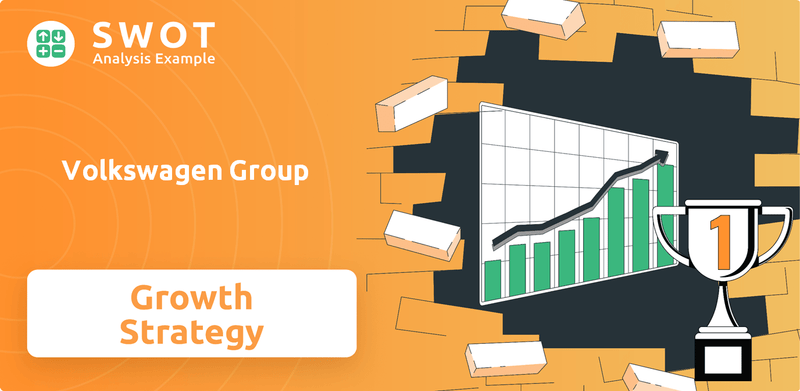
This article delves into the Volkswagen Group SWOT Analysis, exploring its ambitious growth strategy, which is essential for understanding the Volkswagen future prospects. We'll dissect Volkswagen's market analysis, examining how it plans to leverage its diverse brand portfolio and global market share to navigate the challenges and opportunities within the Volkswagen automotive industry. Furthermore, we will explore the Volkswagen Group expansion plans and investment strategy, providing a comprehensive Volkswagen company profile that offers actionable insights for investors and industry watchers alike.
How Is Volkswagen Group Expanding Its Reach?
The Volkswagen Group is aggressively pursuing a multi-faceted expansion strategy, with a strong focus on penetrating new markets, diversifying its product offerings, and establishing strategic partnerships. This comprehensive approach is designed to solidify its position in the global automotive industry and drive sustainable growth. The company's future prospects look promising, driven by strategic investments and a clear vision for the future.
A core element of the Volkswagen growth strategy is its ambitious push into the electric vehicle (EV) market. The company is committed to launching over 70 electric vehicle models by 2030 and has pledged significant investments in EV development. This strategic pivot is crucial for adapting to evolving consumer preferences and meeting stringent environmental regulations worldwide. The company is also focusing on enhancing its after-sales business by providing exceptional customer service, efficient maintenance, and timely spare parts availability.
Geographically, the company is targeting significant expansion in key markets such as North America and China. In North America, the focus is on introducing products tailored to American customers, including the revival of heritage brands. In China, the world's largest automotive market, the company is intensifying its electric vehicle strategy, developing China-specific EV models, and partnering with local technology companies.
The company aims for 70% of its sales in Europe and 50% in the US and China to be electric vehicles by 2030. In Q1 2025, unit sales of fully electric cars in Western Europe more than doubled. Order intake for BEVs rose by 64%, accounting for over 20% of the total order book.
North America remains a key element in the Volkswagen Group's growth strategy, with plans to grow in the region with products tailored to American customers. In China, the company aims to introduce 40 new models from its brands by 2027, with more than half being electric.
The company is planning to introduce around 30 new models globally in 2025, including the new Volkswagen T-Roc and Audi Q3. Electric small cars for around €25,000 are planned for premiere at the IAA. An electric entry-level model for €20,000 is also in development.
A significant move in late 2024 was the company's $5.8 billion investment in an alliance with Rivian, granting access to Rivian's advanced EV architecture. The Volkswagen Group Mobility division is also seeing growth, with new contracts increasing by 4.6% to over 2.49 million units in Q1 2025, and new BEV contracts rising by 62.3% worldwide.
The Volkswagen Group's expansion initiatives are supported by strategic partnerships and a robust product pipeline. The company's commitment to electric mobility is evident in its investment in Rivian and its plans to introduce numerous new EV models. This comprehensive approach, combined with the focus on key markets and after-sales services, positions the company for continued growth and success in the evolving automotive industry. For a deeper understanding of the company's marketing approach, consider reading about the Marketing Strategy of Volkswagen Group.
The Volkswagen Group's expansion strategy focuses on several key areas to drive future growth and solidify its position in the automotive industry. These include a strong emphasis on electric vehicles, geographic expansion in key markets, and strategic partnerships to enhance technological capabilities.
- Aggressive EV Push: Launching over 70 EV models by 2030.
- Geographic Focus: Expanding in North America and China.
- Product Diversification: Introducing around 30 new models in 2025.
- Strategic Partnerships: Investing in Rivian for EV architecture access.
Volkswagen Group SWOT Analysis
- Complete SWOT Breakdown
- Fully Customizable
- Editable in Excel & Word
- Professional Formatting
- Investor-Ready Format
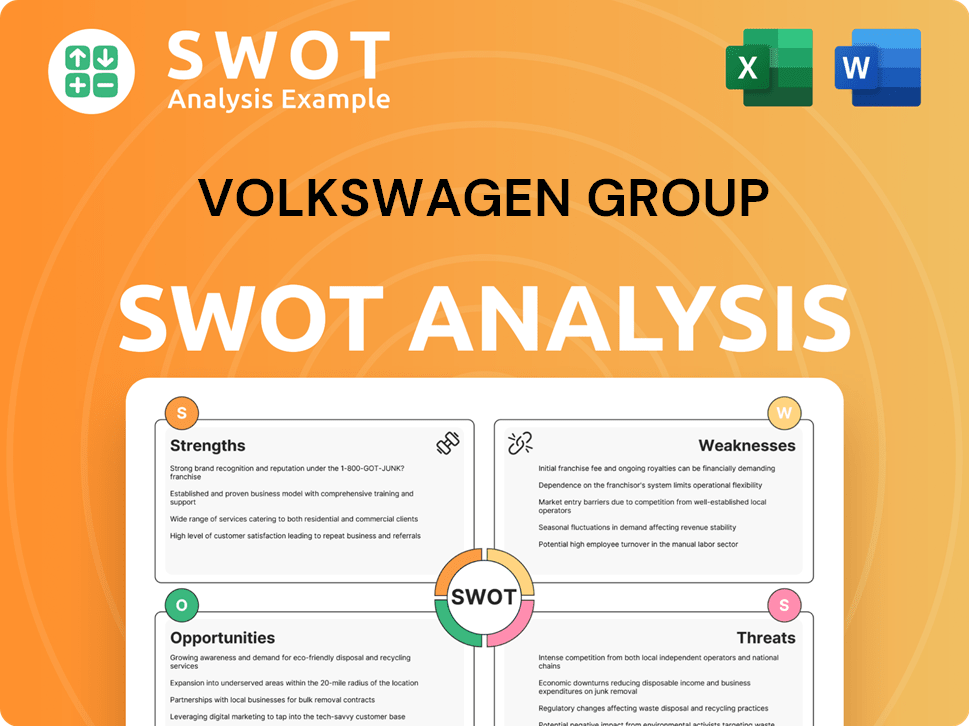
How Does Volkswagen Group Invest in Innovation?
The Volkswagen Group is strategically investing in technology and innovation to drive sustainable growth. This focus encompasses software development, battery technology, and advanced vehicle platforms, all critical components of their long-term vision. These advancements are designed to enhance the user experience, increase operational efficiency, and secure a competitive edge in the evolving automotive industry.
The company's approach emphasizes both in-house development and strategic partnerships. This dual strategy allows Volkswagen Group to maintain control over key technologies while leveraging external expertise. This approach ensures that the company can adapt quickly to technological changes and market demands, strengthening its position in the global market.
The company's commitment to digital transformation and sustainability further underscores its forward-thinking approach. By integrating cloud technology, IoT, and AI, Volkswagen Group aims to optimize production processes and reduce its environmental impact, demonstrating its dedication to a sustainable future.
CARIAD, the dedicated software unit, is central to Volkswagen Group's strategy. The goal is to develop 60% of vehicle software internally by 2025. This in-house development provides greater control over user experience and functionality.
A unified software platform is planned for all VW Group brands by 2025. This platform will enable seamless updates, enhanced connectivity, and advanced driver assistance systems (ADAS). This will improve the customer experience and streamline operations.
Volkswagen will be the first volume manufacturer to offer ChatGPT as a standard feature in many production vehicles from Q2 2024. This integration will enhance the IDA voice assistant. This is a significant step in integrating AI into vehicles.
A specialized 'AI Lab' has been established to identify new product ideas and coordinate them internally. This lab will also facilitate collaborations with tech companies in Europe, China, and North America. This lab will foster innovation and collaboration.
Battery development is a core component of Volkswagen's technology strategy. The company is developing a unified cell, a global, cross-brand technology platform. Production at PowerCo in Salzgitter is scheduled to start in 2025, reducing complexity and enabling scale effects.
In December 2024, Volkswagen AG announced a $48 million investment in Patriot Battery Metals. This investment secures a lithium supply for its automotive battery manufacturing plans. Securing the supply chain is crucial for EV production.
The company is also intensifying its efforts in autonomous driving, with plans to gradually introduce autonomous driving features across its vehicle lineup. Volkswagen is conducting extensive testing of its autonomous driving technology, with the goal of launching commercial autonomous services in the coming years, and is exploring new business models leveraging autonomous technology, such as subscription services and shared mobility solutions. Furthermore, Volkswagen is committed to digital transformation, integrating cloud technology, IoT, and AI to enhance production efficiency and sustainability. Collaborations with companies like CGI are aimed at modernizing IT infrastructure and accelerating software development. The adoption of Dassault Systèmes' 3DEXPERIENCE platform signals a commitment to integrating model-based engineering for optimized vehicle development. On the sustainability front, Volkswagen aims to reduce the carbon footprint of its passenger cars and light commercial vehicles by 30% per vehicle by 2030 (compared to 2018), and by 2025, VW and its partners plan to create around 45,000 high-power charging points in Europe, China, and the USA. To learn more about Volkswagen Group's financial performance and business model, consider reading the article on Revenue Streams & Business Model of Volkswagen Group.
These advancements are central to Volkswagen Group's long-term goals. They demonstrate the company's commitment to innovation and its proactive approach to the challenges and opportunities in the Volkswagen automotive industry.
- Software development is a key focus, with CARIAD leading the way.
- Battery technology is central to the electric vehicle strategy.
- Autonomous driving features are being integrated gradually.
- Digital transformation is enhancing production efficiency.
- Sustainability initiatives are reducing the carbon footprint.
Volkswagen Group PESTLE Analysis
- Covers All 6 PESTLE Categories
- No Research Needed – Save Hours of Work
- Built by Experts, Trusted by Consultants
- Instant Download, Ready to Use
- 100% Editable, Fully Customizable
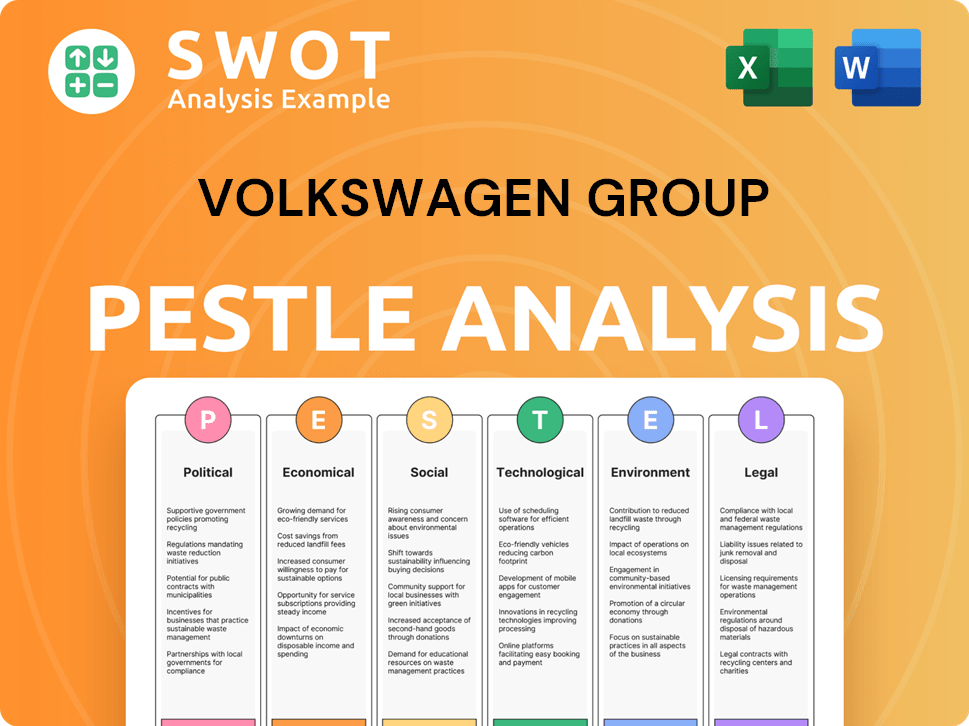
What Is Volkswagen Group’s Growth Forecast?
The financial outlook for the Volkswagen Group in 2025 reflects a strategy focused on sustained profitability and strategic investments. The company anticipates sales revenue to increase by up to 5% compared to the previous year. This growth is occurring amidst a complex global economic environment, indicating the company's resilience and strategic planning.
The operating return on sales for the Group is projected to be between 5.5% and 6.5%, excluding any impact from recently announced tariffs. This projection demonstrates the Group's commitment to maintaining healthy profit margins. The company's financial strategy includes managing costs and optimizing operations to achieve these targets.
In the first quarter of 2025, the Volkswagen Group reported sales revenue of €77.6 billion. This represents a 2.8% increase compared to the €75.5 billion reported in Q1 2024. The operating result for Q1 2025 was €2.9 billion, which was below the €4.6 billion reported in Q1 2024. This resulted in an operating margin of 3.7%, impacted by special effects.
The operating result for Q1 2025 was €2.9 billion, with an operating margin of 3.7%. This was affected by approximately €1.1 billion in special effects. Adjusted for these effects, the operating result was around €4.0 billion, with an operating margin of 5.1%.
Net cash flow in the Automotive Division for Q1 2025 was negative at €0.8 billion, influenced by M&A and restructuring. For the full year 2025, automotive net cash flow is expected to be between €2.0 billion and €5.0 billion. Net liquidity in the Automotive Division in 2025 is expected to be between €34 billion and €37 billion.
The Volkswagen Group Mobility division began 2025 with a strong first quarter. The operating result rose to €948 million, increasing by 20.6% compared to the same period last year. The earnings forecast for this division for the full year 2025 is confirmed to be significantly above the previous year.
The company is targeting continuous increases in earnings in the coming years, aiming for a medium-term return on sales of 8% for the Brand Group Core. Volkswagen plans to invest a total of €180 billion over the next five years. The goal is to reduce the investment ratio to below 11% by 2027 and around 9% by 2030.
The Volkswagen Group's financial outlook for 2025 anticipates growth in sales revenue and a focus on maintaining profitability. The company's strategic investments are geared towards long-term growth. For more detailed insights, consider reading an article on the Volkswagen Group's financial performance.
- Sales revenue growth up to 5%
- Operating return on sales between 5.5% and 6.5%
- Automotive net cash flow between €2.0 billion and €5.0 billion
- Net liquidity in the Automotive Division between €34 billion and €37 billion
Volkswagen Group Business Model Canvas
- Complete 9-Block Business Model Canvas
- Effortlessly Communicate Your Business Strategy
- Investor-Ready BMC Format
- 100% Editable and Customizable
- Clear and Structured Layout
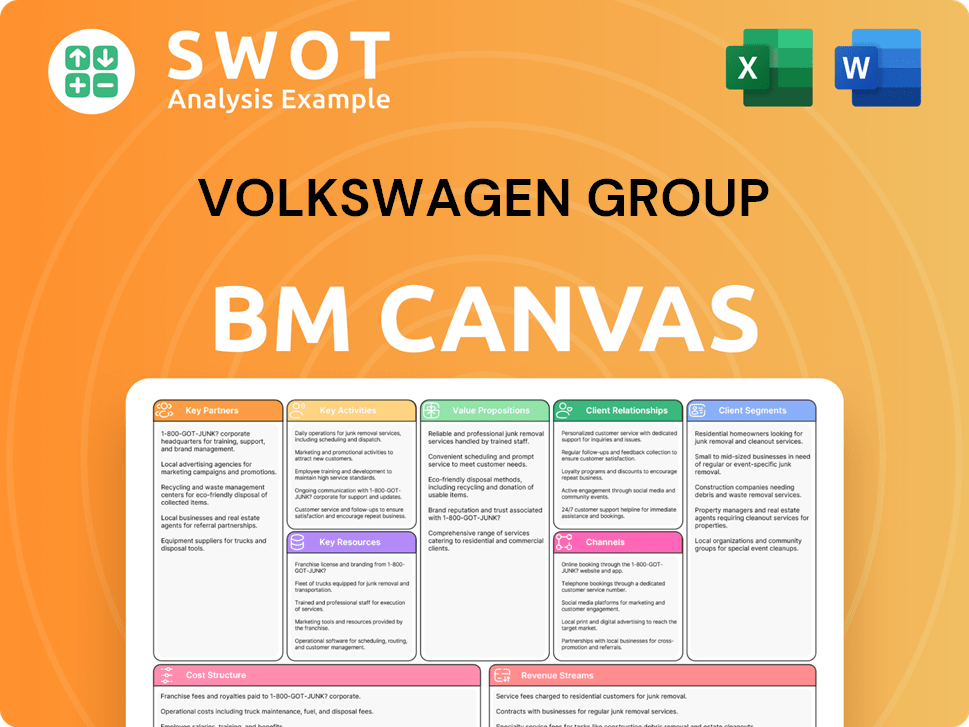
What Risks Could Slow Volkswagen Group’s Growth?
The Volkswagen Group faces several significant risks and obstacles that could affect its growth strategy. These challenges range from intense market competition to the rapid advancements in technology and shifts in the regulatory landscape. The company must navigate these hurdles to maintain its position in the automotive industry and achieve its long-term goals.
One of the primary concerns for the Volkswagen Group is the competitive pressure from both established automakers and emerging players. The automotive industry is undergoing a period of rapid transformation, with electric vehicles and software-defined vehicles reshaping the market. Successfully adapting to these changes is crucial for the company's future prospects.
Furthermore, the Group must manage internal resources effectively while addressing external factors like economic volatility and geopolitical tensions. The company's ability to mitigate these risks will determine its ability to grow and remain competitive in the global automotive market.
Intense competition, particularly from Chinese manufacturers, presents a major challenge. These competitors are rapidly gaining market share with lower-cost vehicles that offer comparable features and technology. This increased competition has led to a decline in the Group's market share in China and Western Europe.
Slower adoption of electric vehicles (EVs) in Europe compared to China is another obstacle. Volkswagen's EV sales in Europe fell by 24% in the first quarter of 2024. This slower pace could hinder the Group's transition to electric mobility and its ability to meet emissions targets.
Stringent emissions regulations and new energy vehicle quotas pose ongoing risks. Non-compliance with CO2-related requirements can result in substantial penalties, such as a €95 premium per excess gram of CO2 per newly registered vehicle in the EU. Adapting to these regulations is crucial for the Group's financial performance.
Supply chain vulnerabilities and fluctuating commodity, energy, and foreign exchange markets create financial pressures. These factors can impact production costs, profitability, and overall financial stability. The Group must manage these risks to maintain its operational efficiency.
Technological advancements, particularly in software-defined vehicles and autonomous driving, are key risks. While the Group is investing heavily in these areas, successful implementation and overcoming historical software issues with its CARIAD subsidiary are crucial. The digital transformation journey presents execution challenges.
Internal resource constraints and the need for cost optimization are significant. The Group has initiated cost reduction plans, including measures to cut costs by 20% and shorten product development time from 50 to 36 months. The 'Zukunft Volkswagen' agreement aims to ensure competitiveness through workforce and plant structure adjustments.
Political uncertainty, increasing trade restrictions, and geopolitical tensions pose additional challenges. The Group's risk management framework includes diversification, scenario planning, and continuous efforts to strengthen its financial robustness across all cost categories. These strategies are essential to navigate the complex global environment.
Measures to reduce costs and optimize operations may lead to potential layoffs and factory closures, which could face opposition from trade unions. The 'Zukunft Volkswagen' agreement aims to balance competitiveness with workforce considerations. Navigating these workforce challenges is crucial for the Group's long-term sustainability.
Volkswagen Group Porter's Five Forces Analysis
- Covers All 5 Competitive Forces in Detail
- Structured for Consultants, Students, and Founders
- 100% Editable in Microsoft Word & Excel
- Instant Digital Download – Use Immediately
- Compatible with Mac & PC – Fully Unlocked
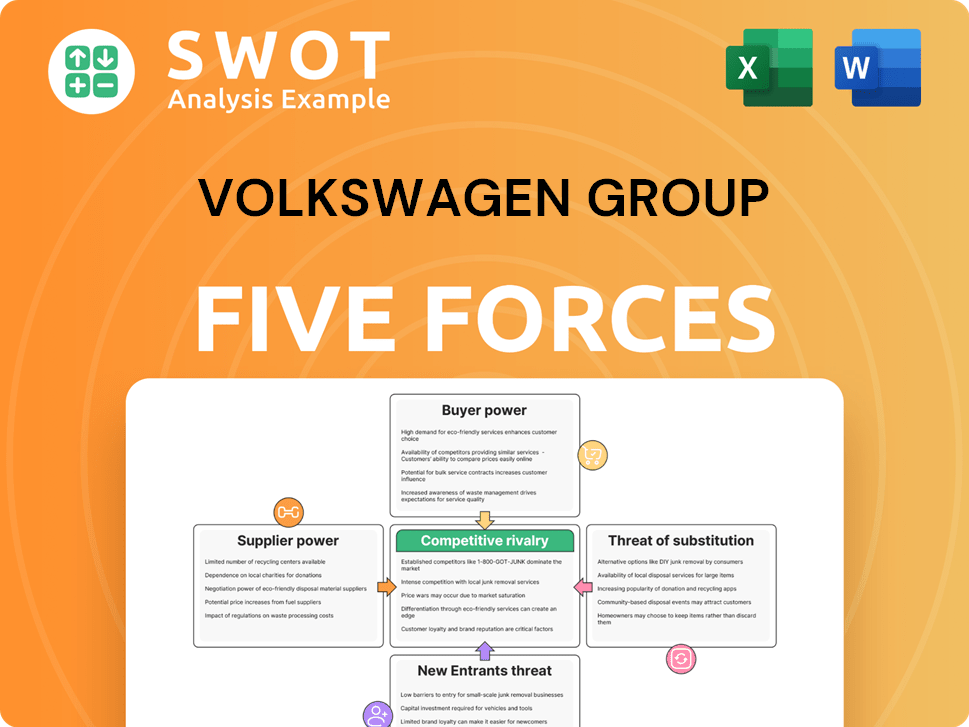
Related Blogs
- What are Mission Vision & Core Values of Volkswagen Group Company?
- What is Competitive Landscape of Volkswagen Group Company?
- How Does Volkswagen Group Company Work?
- What is Sales and Marketing Strategy of Volkswagen Group Company?
- What is Brief History of Volkswagen Group Company?
- Who Owns Volkswagen Group Company?
- What is Customer Demographics and Target Market of Volkswagen Group Company?
Disclaimer
All information, articles, and product details provided on this website are for general informational and educational purposes only. We do not claim any ownership over, nor do we intend to infringe upon, any trademarks, copyrights, logos, brand names, or other intellectual property mentioned or depicted on this site. Such intellectual property remains the property of its respective owners, and any references here are made solely for identification or informational purposes, without implying any affiliation, endorsement, or partnership.
We make no representations or warranties, express or implied, regarding the accuracy, completeness, or suitability of any content or products presented. Nothing on this website should be construed as legal, tax, investment, financial, medical, or other professional advice. In addition, no part of this site—including articles or product references—constitutes a solicitation, recommendation, endorsement, advertisement, or offer to buy or sell any securities, franchises, or other financial instruments, particularly in jurisdictions where such activity would be unlawful.
All content is of a general nature and may not address the specific circumstances of any individual or entity. It is not a substitute for professional advice or services. Any actions you take based on the information provided here are strictly at your own risk. You accept full responsibility for any decisions or outcomes arising from your use of this website and agree to release us from any liability in connection with your use of, or reliance upon, the content or products found herein.